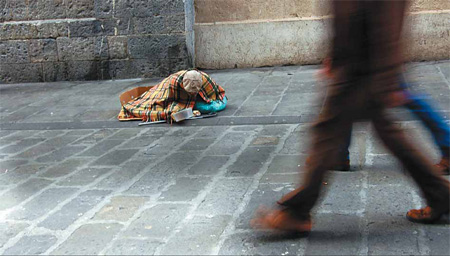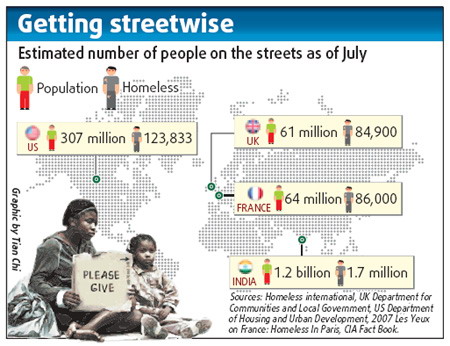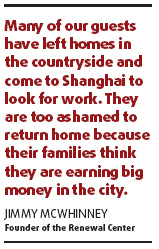Highlights
Govt urged to help NGOs help homeless
By Cao Li (China Daily)
Updated: 2009-10-13 09:50
After spending 11 years living on the streets, Ma Long's life was finally turned around this year - by a hot shower.

The 21-year-old decided last March to visit a free facility in Shanghai for the homeless.
Just a few months later, he became a volunteer at the Renewal Center, founded by Jimmy McWhinney, a 35-year-old Texan who arrived in the city in 2001 with the aim of learning Chinese and helping the homeless.
After talking to people living on the streets, the veteran charity worker discovered most lacked even basic necessities like drinking water and washing facilities. Last year, he rented a two-room apartment by Suzhou Creek in the city's Jing'an district for 5,200 yuan ($760) a month and opened the Renewal Center.
"For six weeks, no one came. Then, one day, we got a guest. Soon after, we had a few and then more and more started to come. Now we open twice a week, Wednesday and Sunday, and receive an average of 30 guests a day," said McWhinney.

"Many of our guests have left homes in the countryside and come to Shanghai to look for work, but most find only boring or laborious jobs and give up, preferring a life on the streets. They are too ashamed to return home because their families think they are earning big money in the city," he explained.
"It's a vicious cycle. We can intervene and encourage people to restore relationships with their families and return home, or help them find a job with development potential."
Ma is already back on his feet and this month starts working at a bedding factory in the Pudong area. But he is just one of the millions of people who migrated from poor regions to large cities like Shanghai, Beijing and Guangzhou only to end up homeless.
For many, there is no nearby Renewal Center offering help.

No official figures are available for how many people are sleeping rough in China. However, in August last year, the Ministry of Civil Affairs said there were 1.7 million "homeless and beggars", including 188,000 under 18-year-olds. A report on the ministry's website also estimates there could be up to another 1.5 million minors and adults living on the streets.
Many vagrants, particularly young people, are abused or forced into a life of crime, experts say.
"I was asked to join many gangs, and I was beaten up each time I refused. But at times I did steal and rob to buy food," admitted Ma.
Cheng Fucai, a researcher for the Shanghai Academy of Social Sciences who documented the lives of homeless children over a six-year period in a book published this year, said young people on the streets are forced to depend on adults.
"Criminal gangs always try to recruit the kids and, during my study, I was told of a boy whose arm was chopped off by gangsters after he refused to steal a cell phone," he said. "I also know a man looks after eight boys around Shanghai Railway Station and sexually abuses them."
Criminals also steal and disable children from families in poor, rural areas and make them beg in city streets, added Wu Danmei, a teacher in philosophy and public affairs with Heilongjiang University in Harbin.
The Shanghai public security bureau declined to comment on the estimated number of crimes committed by homeless people and beggars.
The current government policy to assist the homeless and street beggars was issued in 2003, when rules stipulating they should be detained and repatriated were abolished. In 2006, the Ministry of Civil Affairs said China would spend at least 1.1 billion yuan to build facilities for homeless minors by the end of next year.
State-run centers offer vagrants meals, beds and train tickets home. Only during special events, such as the Beijing Olympic Games, are they restricted from leaving, according to experts.
However, the government policies cannot be implemented in some cities and occasional accidents have been reported in several aid centers.
In 2003, Xue Baoling, now 46, was raped by a security guard at a government shelter in Nanning, capital of the Guangxi Zhuang autonomous region. A year later, the center and security firm were ordered to pay a combined 1,000 yuan in compensation by a Nanning court.
Despite hardships on the streets, experts say vagrants are unwilling to use the State-run aid centers, which benefit from huge amounts of funding.












